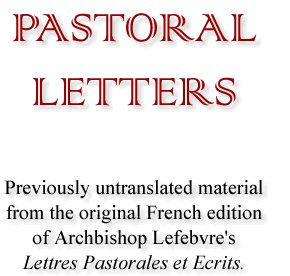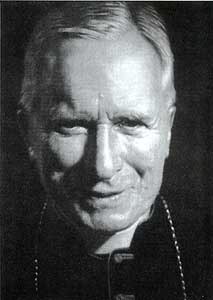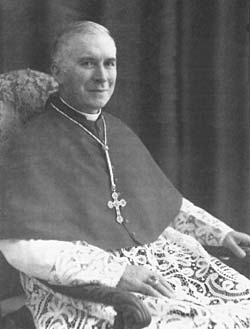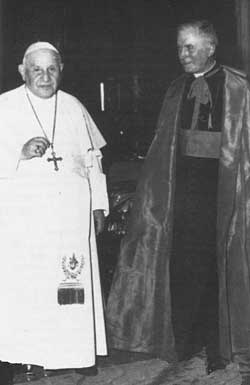Pastoral Letters: Necessity of Prayer
 |
 |
The Necessity of Prayer
Pastoral letter from Rome, on the Feast of the Conversion of St. Paul, Jan. 25, 1962. Written very shortly before Archbishop Lefebvre learned of his transfer from Dakar, and appointment as bishop of Tulle, France.
In his Apostolic Letter of September 29th last, in which he extolled the prayer of the Rosary, His Holiness Pope John XXIII had this in particular to say:
O blessed Rosary of Mary, how sweet it is to see you held aloft in the hands of holy priests, of pure souls, young and old, who know the value and the efficacy of prayer, lifted high by devout multitudes without number as their emblem, their standard, bringing tidings of peace to human hearts, peace to all mankind.
Do we truly "know the value and the efficacy of prayer"?
For a long time there has been a community of Benedictine nuns at Sebikhotane, and now contemplative monks of the same order have also arrived—"contemplative" meaning that their lives are devoted to prayer and to the praise of God. Blessed Sacrament Fathers are also coming to Medina to start semi-perpetual adoration of the Eucharist at St. Joseph's. I should like, therefore, to use the following lines to shed the light of faith and truth upon the necessity, the paramount importance of prayer for the whole of the Christian life, and upon the mystery of its effectiveness in our apostolate. Let all priests, religious and faithful of the diocese be convinced of this truth, which is essential to all spiritual life, and to all missionary activity.
Our Lord assures us that whatsoever we ask in prayer, with faith, will be granted us (Mt. 21:22) and indeed it is in the light of faith that we must ground our understanding of prayer. The liturgy, the prayer of the Church, gives us a prime example of how we should pray.
All liturgical prayer is made in the name of our Lord. It is in Him and with Him that we must address our prayers to God the Father. "Whatsoever you shall ask the Father in My name, that will I do; that the Father may be glorified in the Son" (Jn. 14:13).
Prayer as the Source of the Interior Life
|
Official portrait of Archbishop Lefebvre as the new Superior General of the Holy Ghost Fathers, the largest missionary order in the Church. He was elected in July, 1962. He resigned from the position in 1968. |
|
It can be truly said that prayer holds within itself as in a casket all the treasures of ascesis and union with God. In prayer we put into practice all the theological and cardinal virtues. Is it possible to pray without believing, without hoping, without loving? Can we pray without adoring, without annihilating the self before God, which is the ultimate act of justice? To pray is to be prudent and wise; it is to replenish one's lamp with oil whilst awaiting the coming of the Bridegroom. To pray is to be strong in the power of the Almighty. And, finally, how can one lift up one's soul to God without distancing oneself from created things and acquiring temperance in their use? Prayer will establish our souls in truth and right order, that is to say in humility, and trust, and peace.
That is why we should not be surprised at the atmosphere of truth and peace that we experience in monasteries. So many souls, wearied of life in a climate of falsehood and error, disorder and dissent, hasten to monasteries, those oases of order and truth, there to nourish their souls on prayer and all its fruits—wondrous fruits of knowledge and love of God in our Lord, fruits of union with God and surrender to His Holy Will.
This will be a primary result of the presence in the diocese of the Abbey of Keur Moussa: to enable souls to encounter the Lord our God in prayer, especially liturgical prayer.
But if this first effect of prayer is the more readily visible, there is still another, more mysterious indeed, but no less real, which we do well to ponder upon with faith, and that is prayer's efficacy for the apostolate.
The Apostolic Efficacy of Prayer
Before we come to the considerations which will demonstrate the manifest truth of this statement, we would do well to be on our guard against a tendency which today is quite widespread even in the most Christian circles.
The desire to do good in the world around us leads us to reflect upon the means we should employ to bear witness, to be the leaven in the dough of society and to be present in all its parts, and indeed, this desire is to be warmly applauded. However, the conclusions to which our enquiries lead us, and which do in truth reveal to us the wounds from which our society suffers, often lead us to seek to employ too exclusively human methods, whose apparent effectiveness appeals to our minds. And these methods appear all the more indispensable when we compare them with those used by the Church's enemies, which seem highly effective.
Herein lies a great danger, especially for young minds, which are easily carried away, and whose imagination finds outward appearances persuasive.
To make right decisions regarding these problems of evangelization, of the apostolate, one must above all see them through the eyes of faith, as our Lord did and does see them. Was society perfect in His day? Did mankind practice the virtues in all aspects of life, individual, domestic, social? Hardly.
Our Lord did not disdain to use human implements—His own humanity in the first place, and then His disciples whom He trained for three years. But all founders of religious sects have done that. What was clearly unique about our Lord was that the breath of the Holy Spirit animated His whole being, and that it was this same divine Spirit who would fill the souls of the apostles on the day of Pentecost. And in this Spirit, in the power of this Spirit, the powers of darkness would be shaken by the Apostles, and by the Church throughout the ages.
The conclusion is obvious: to act without this Spirit, without having taken the measures necessary to have Him with us and in us, is to act without our Lord. Now, He Himself told us, "Abide in me, and I in you...He that abideth in me, and I in him, the same beareth much fruit; for without me you can do nothing" (Jn. 15:4-5). In other words, he who dwells in Me, that is, in My Spirit, will be highly effective; he who is not in Me will be ineffective. And further on He says, "You have not chosen me; but I have chosen you, and have appointed you, that you should go and should bring forth fruit (that is, that you should be effective.)" (Jn. 15:16).
What does "to dwell in our Lord and our Lord in us" mean if not to be in a habitual state of prayer?
Without prayer we should be ineffectual in our Lord's work, the apostolate. It is useless our pondering over the catalogue of available means to be employed in the transformation and conversion of our brethren, or facing up to the machinations of the enemies of good and of peace, the enemies of God, if we are not assured that the spirit of our Lord is in us and with us.
The whole of the Old and the New Testaments and the whole history of the Church are an illustration of this truth.
Let us remember the prayer of Abraham, of Moses, of Judith and Tobias; let us recall the prayer of the Virgin Mary, her Magnificat, and the prayer made at Pentecost, and how the Apostles took care to set time apart for prayer. Then there are the exhortations of the popes, and in particular of our Holy Father Pope John XXIII, asking us to pray. But above all we have the life of our Lord, which was but one long prayer in word and action. And why? "My Father is the husbandman...I am the vine; you the branches..." (Jn. 15:1, 5) "Father, the hour is come. Give them eternal life" (cf. Jn. 12:1-2). This was the great prayer of Christ which was to be realized in the Last Supper and on the Cross, and perpetuated in the liturgy of the Church.
As confirmation of what I have said here are some statements of Church councils which express the thought of the Church on the need for the action of the Holy Spirit in the work of evangelization, and the intimate connection between the Holy Spirit and prayer:
...Let us consider also the mysteries of the prayers said by the priests. Handed down by the Apostles, they are celebrated in the same way throughout the whole Catholic Church, so that the rule of prayer may establish the rule of faith. When those who preside at the sacred assemblies fulfill the mission entrusted to them, they present before the Divine Mercy the cause of the human race, and, the whole Church groaning with them, they pray and beseech that faith may be given to unbelievers, that idolaters may be delivered from the errors that leave them Godless, that the veil covering the hearts of the Jews may be removed, and that the light of truth may shine upon them, that heretics may repent and accept the Catholic faith, that schismatics may receive the spirit of rekindled charity, that to the fallen may be granted the medicine of penitence, and finally, that the palace of the heavenly mercy may be opened to the catechumens who have been brought to the sacrament of regeneration...
All this is so strongly felt as being the work of God that continual praise and thanksgiving are addressed to God, who does these things, for having enlightened and corrected these people... (Conciliar Declarations of the fifth century, from La Foi Catholique, No. 537)
|
Archbishop Lefebvre with Pope John XXIII |
Let us take care, then, not to rely on ourselves alone, on our human resources, on our own thinking and intelligence, our own efforts, our organization, our plans, to achieve a goal which is God's, in a domain which is His, the domain of souls. And the same applies even in the domain of temporal things, which God has created to be at the service of souls.
If we do not want to be beaten before we start, we have to set ourselves to prayer and make sure that others ceaselessly offer up prayers to help us.
This incense which rises before God to praise and adore Him through our Lord, and to obtain for us His Spirit, is none other than the prayer of monks and nuns, and of the whole Church, which prays constantly with Jesus and in Him.
It is so very true that the liturgy, the work of God par excellence, is the greatest manifestation of charity toward God and our neighbor. Nothing is more missionary than the prayer which called down the Holy Spirit upon the Apostles. And it is that same prayer of our Lord which is perpetuated in the sacred liturgy of the Church, a prayer which, by our Lord's own promise, is ever efficacious.
This prayer, which the Church sets upon our lips, is the voice of the Bride, which intercedes for believers and unbelievers and for all spiritual creatures living on the earth, and especially for the dying, 150,000 of them each day. More than that, this prayer reaches beyond the veil and into Purgatory, and there, too, it calls forth the outpouring of the purifying Spirit.
Thus the prayer of monks, far from shrinking their hearts, widens them to match the Heart of Jesus. Nothing is more fruitful in charity, and, in consequence, so efficacious as is prayer as a means of the spreading of our Lord's kingdom within mens' souls, in time and in eternity. (Rome, Jan 25, 1962.)
Postscript
Just as this pastoral letter was about to go to the printers, We received notice of the Holy See's decision. We think, however, that these lines, the last We shall be addressing to the faithful of the diocese of Dakar, will be for them a final expression of Our pastoral care and of Our affection in our Lord. (Dakar, Feb. 2, 1962.)
HUMILITY
Letter of Archbishop Lefebvre published in Avis du mois (May-June, 1968), the monthly letter of the Superior General of the 5,200-member Congregation of the Holy Ghost.
This will be the last monthly bulletin I write to you, and I have a secret desire to devote it to the virtue which today risks most easily being forgotten: humility.
I believe that the spirit guiding many of today's reformists is in opposition to this fundamental virtue of evangelical spirituality. Modern ideas of obedience, of community life, of the apostolate, of sanctity itself, give pride of place to personal vocation, to charismas, to the dignity of the human person demanding respect for personal ideas, personal inclinations. How can this thinking be reconciled with humility? "The humble soul," says our Venerable Fr. Francis Libermann, "obeys meekly, willingly, and without arguing, because it has no attachment to its own will. Humility is the mother of regularity, the support of brotherly unity, and the surest guarantee of subordination" (Direction spirituel, p. 220).
Our Lord clearly taught us the same doctrine. Discite a me quia mitis sum et humilis corde—Learn of me, because I am meek, and humble of heart (Mt. 11:29). Omnis qui se exaltat, humiliabitur: et qui se humiliat exaltabitur—every one that exalteth himself shall be humbled; and he that humbleth himself shall be exalted (Lk. 18:14).
And there are so many texts one could quote from the Apostles, especially the one from St. Paul, in Philippians (chap. 2), where he speaks of our Lord's example: Semetipsum exinanivit, humiliavit semetipsum factus obediens propter quod et Deus exaltavit illum—... (he) emptied himself, he humbled himself, becoming obedient for which cause, God also hath exalted him.... This is also the lesson taught by the Blessed Virgin Mary when she sings of God's goodness towards her: Respexit humilitatem ancillae suae. All the saints have given a living example of this virtue, which is the sine qua non for God's presence in the soul. St. Thomas Aquinas says of it that indirectly it is the chief among virtues, in that it removes obstacles by banishing pride, and thus renders man docile and open to the influence of God, who resists the proud and gives grace to the humble (Summa Theologica, II-II, Q. 161, A. 5).
It is clear, then, that any reform, any aggiornamento, which did not tend towards greater humility, towards a great denial of our own will and our self-love, any reform which would destroy the virtue of obedience, and so destroy ipso facto the spirit of community and the spirit of prayer, would contribute to the destruction of all religious societies, founded as they are upon the quest for holiness, which is the indispensable condition for an effective apostolate. That is the authentic spirit of our Venerable Father, simple and lucid like the Gospel itself.
How fruitful would be a general Chapter which insisted strongly on these virtues, and so rediscovered the wellsprings of our Congregation's original fervor. It would suffice to quote the fundamental passages from our Venerable Father on these matters to bring us back to the true paths of holiness and of the authentic apostolate. Let us beware of allowing ourselves to be led astray by these modern tendencies which "contest" even the most legitimate authority, which abhor any hierarchy, and which are instinctively opposed to a faith which depends entirely upon authority. All that is the work of the evil Spirit, not of the Holy Ghost.
It is very useful for us missionaries to remind ourselves that the virtue of humility is the secret of a true apostolate, for the humble missionary sees and judges all things according to the spirit of faith, and from the perspective of God. Before the workings of God's grace, he knows his proper station, which is that of an instrument, a minister. He sees every human being in terms of his relationship with the Spirit of God, with the grace of our Lord, and so he remains patient, understanding and merciful with hearts that seem closed to grace, while none the less persevering in action, and remaining ever optimistic both in success and, even, in failure.
The humble apostle will discover, as though by a supernatural instinct, the apostolic ways and methods which carry within themselves the grace of the Holy Ghost. He will avoid everything that makes too much of human activity, and throws the spotlight on the instrument at the expense of the one, true Apostle. He will be given more to prayer than to discussion, more to the practice of virtue than to giving learned lectures about it.
"Endeavor, therefore, to ground yourselves firmly in this beautiful and important virtue. If you have it, all the others will come easily to you..." (Direct. spirituel, p. 221)


